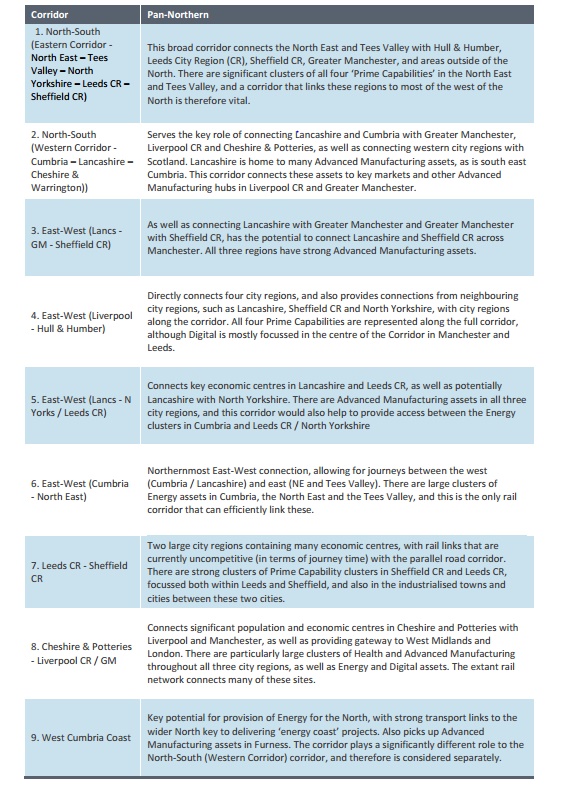19.06.17
TfN identifies vital pan-northern corridors to inform Strategic Transport Plan
Evidence that will support the formulation of the first-of-its-kind Strategic Transformation Plan (STP), including the identification of nine pan-Northern priority corridors, has today been published by Transport for the North (TfN) and its partners.
In three reports published today, which include a Position Statement, an Initial Major Roads Report and an Initial Integrated Rail Report (IRR), researchers looked into how the plan will add value for people and businesses in the north and also how it will align with local transport initiatives and strategies in the region to give the greatest benefit to travellers.
The Initial Integrated Rail Report (IRR) identifies where strategic improvements are needed to rail services and infrastructure to enable easier commuting, better links for business and better connectivity internationally. At this stage, the initial IRR has identified nine pan-Northern priority corridors, which, in parallel to the Initial Major Roads Report, will contribute to a portfolio of corridor-based interventions within the STP. The corridors are:

TfN added that connectivity priorities have been identified in three broad groups: schemes which are already under construction or which are committed (i.e. funding is in place); schemes which are defined, and therefore likely to proceed once funding is secured; and priorities identified by TfN partners, which present a range of possible interventions of national or pan-Northern significance.
Today’s findings also revealed plans to make the north a leader in driving the UK towards a low-carbon economy, taking real action on air pollution and creating a “truly integrated transport system,” with smart ticketing to enable multi-modal door-to-door journeys are essential ambitions to aim for in the final Plan.
“TfN has a clear mission to transform the north’s economy by intelligently developing our transport infrastructure,” said David Brown, TfN’s outgoing chief executive.
“The publication of this evidence is a pre-cursor to our multi-modal STP, which will be published for consultation later this year,” he added. “The work presents a compelling case for change, underlining the economic and strategic benefits of improving freight and passenger transport across the whole of the North to drive economic growth.”
Brown added that TfN wanted to enable the north to make a more significant contribution to the UK economy, through higher productivity while also increasing job opportunities.
“This will require the delivery of a sustained and aspirational investment programme across the North to build infrastructure, strengthen skills, harness innovation and encourage smart and innovative technology,” he concluded.
Bridget Fox from Campaign for Better Transport, who wrote one of the reports, added: “Our report identified a number of key challenges and opportunities including concerns about climate change, pollution and the landscape; the desire for more sustainable transport, rather than building new roads; and a desire to see improved local services to connect people to jobs.
“These combine to offer an exciting vision of what the Strategic Transport Plan could look like and the challenge now for TfN is to ensure that these community and environmental concerns are addressed in the final plan.”
Have you got a story to tell? Would you like to become an RTM columnist? If so, click here.